It’s a common scenario where mouthwash gives us a minty fresh feeling immediately after rinsing. It is a feeling equivalent to instant cleanliness, right? However, the question that really matters is whether mouthwash is necessary for maintaining the health of the teeth and the gums. To put it briefly, the answer is no, not always.
Mouthwash is not necessarily a must for everyone; however, it can be a good addition to your daily oral care routine — if you suffer from bad breath, plaque build-up, or have dental issues especially. It is time to discover the truth about the minty freshness and the differences in the occasions when mouthwash really matters.
1 ) Understanding Mouthwash: Cosmetic vs. Therapeutic
The quality of mouthwash varies greatly among the different types. The two main types and their distinctions should be understood in order to choose the best one for your smile.
1. Cosmetic Mouthwashes
The mouthwashes give you that “fresh breath” feeling, but, in fact, they offer nothing more than a temporary solution. The odors from bacteria or food are masked, but the source is still there and, in fact, not even eliminated. For a short, on-the-spot refreshment before a meeting or a date, they are good—however, not enough for getting true oral health benefits.
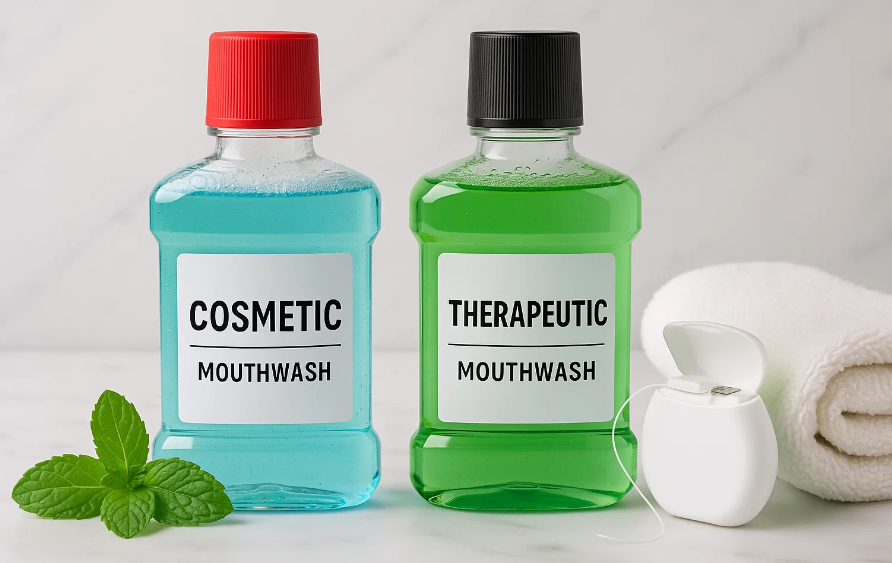
2. Therapeutic Mouthwashes
They are the true champs. The ones containing active ingredients like essential oils, fluoride, or antimicrobial agents (such as cetylpyridinium chloride or chlorhexidine), therapeutic rinses are determined to take bacteria, plaque, and gum inflammation down. They make your mouth not just smell fresh—they help keep it healthy—infact, they also help keep it healthy.
2) Top Benefits of Using Mouthwash (When Done Right)
This is the spot where mouthwash really obtains its rightful place in the bathroom cabinet.
1. Bad Breath (Halitosis) Fighter
Mouthwash therapeutics kill the bacteria that cause bad breath. These don’t merely mask odors like their cosmetic counterparts, but rather tackle the problem at its core.
When bad breath keeps coming back even after the regular brushing and rinsing, the reason could be an underlying dental issue — it’s time to consult your dentist.
2. Helps Reduce Plaque and Gingivitis
Antimicrobial mouthwash can go to areas that your toothbrush cannot reach at all, for example, between your teeth, the back of your mouth, and under braces. Regular application works to avoid the build-up of plaque and also to reduce gum inflammation.
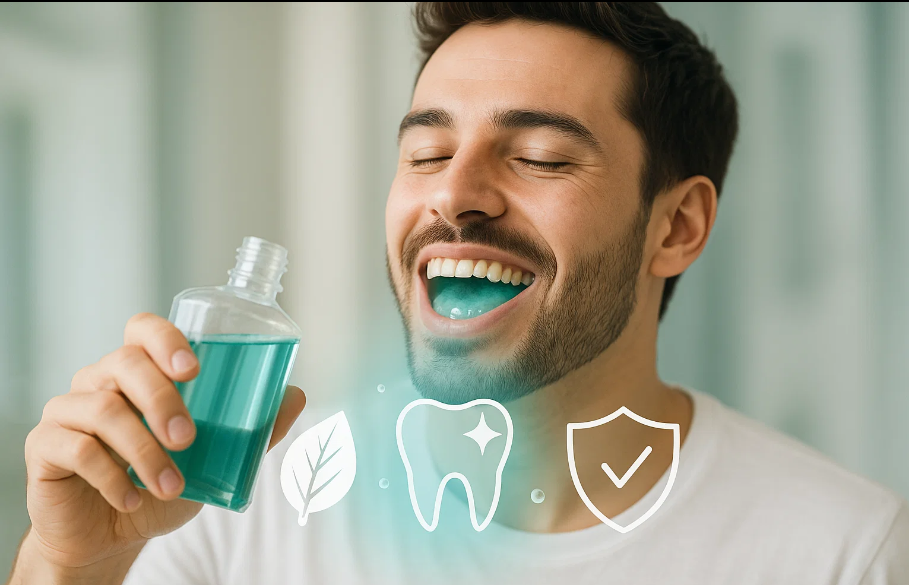
3. Fluoride Prevents Cavities
Fluoride mouthwash makes the enamel strong and thus prevents the acid attacks caused by eating sugary food. They are particularly good if you are prone to cavities or live in a place where the water supply has a low fluoride level.
4. Dry Mouth Relief (Xerostomia)
Some of the mouthwash brands use xylitol along with other hydrating agents, which facilitate the user to get rid of dry mouth. Alcohol-free formulas are the safest option as alcohol may cause more dryness and irritation.
5. Post-Procedure Healing Support
Following dental operations or deep cleanings, dentists frequently suggest using chlorhexidine rinses to avoid infections and quicken healing. However, these are generally prescribed for short-term use only.
Why Mouthwash Works (When Used Correctly)
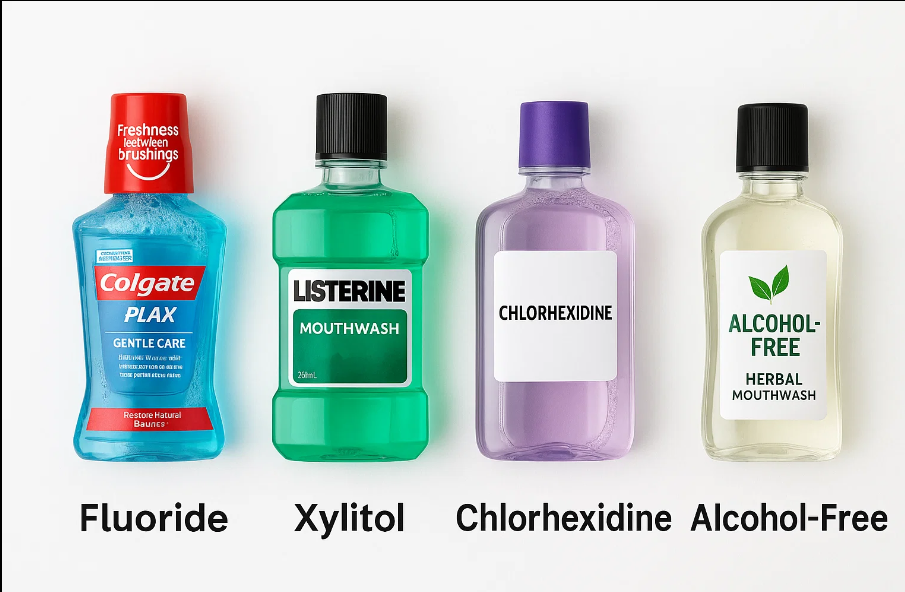
Mouthwash is an extra measure, not a replacement. It works best in conjunction with regular brushing and flossing. Consider it as your oral care “booster shot” — an additional shield against germs, not the main one.
- Right after brushing, do not rinse – this will wash off the fluoride in the toothpaste that is in concentrated form.
- Do the brushing for 30 minutes or at some other time of the day (like after lunch) use mouthwash.
- Gargle for at least 30 seconds so that the solution can do its job.
- Mouthwash, when used correctly, can improve your routine without disrupting the natural microbiome of your mouth.
A few easy tips for use:
When to Skip or Limit Mouthwash
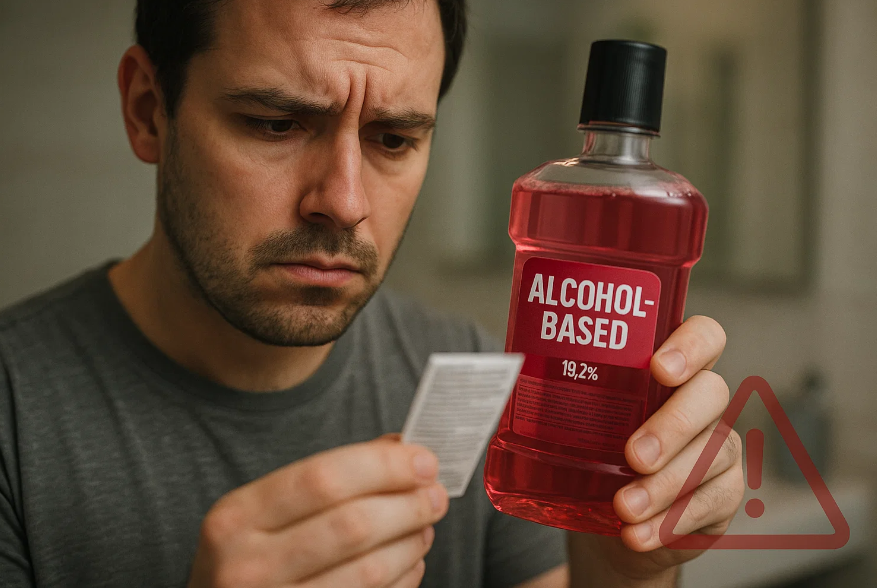
Even the best things can be harmful when they are overused.
The excessive use of antiseptic mouthwash can:
- Cause irritation to the delicate parts of your mouth.
- Lead to dry mouth (especially with alcohol-based ones).
- Hinder the good oral bacteria that are responsible for maintaining the balance.
- If you experience constant burning, dryness, or sensitivity — change to a milder, non-alcoholic type or ask your dentist for a personal recommendation.
Choosing the Right Mouthwash for Your Needs
Your perfect mouthwash depends on your goals. Here’s a quick guide:
| Concern | Best Type of Mouthwash | Key Ingredients to Look For |
|---|---|---|
| Bad breath | Antimicrobial | Cetylpyridinium chloride, essential oils |
| Cavities | Fluoride-based | Sodium fluoride |
| Gum inflammation | Antiseptic | Chlorhexidine (short-term use) |
| Dry mouth | Alcohol-free, moisturizing | Xylitol, glycerin |
| Sensitivity | Gentle enamel-strengthening | Fluoride, potassium nitrate |
The Real Takeaway
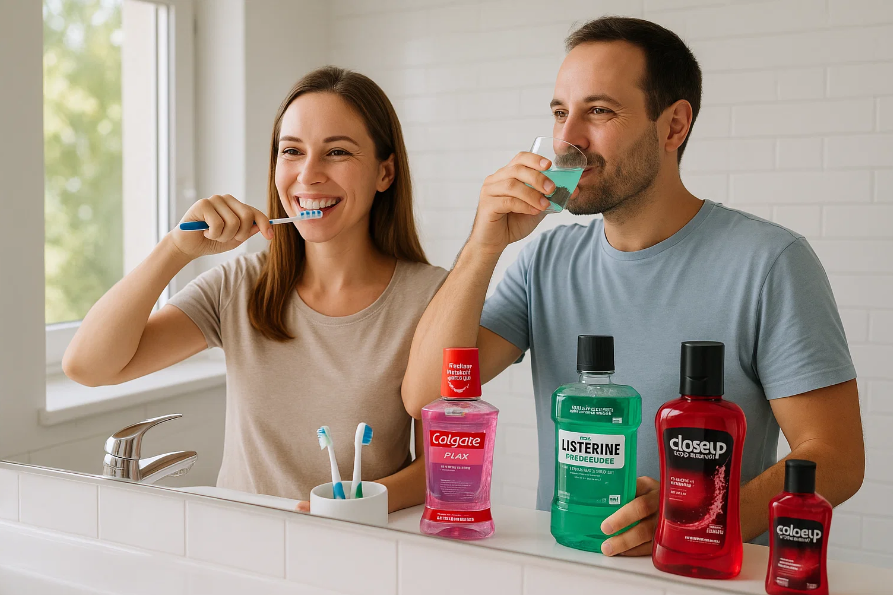
Mouthwash is not a necessity but its utility cannot be denied if used for correct purposes. It works great with your oral hygiene routine — mainly if you have bad breath, plaque, or gum problems.
But keep in mind: no mouthwash can do the job of a toothbrush and toothpaste. They are still the main keys to having clean and healthy teeth.
Thus, when you next go to grab that addictive bottle of minty flavor, you will be aware of the reason why you are using it and how it is incorporated into your genuine oral care plan.
Final Word
The healthy habits will always outshine the quick fixes. Use a combination of brushing, flossing, and the right mouthwash to keep your smile bright, your breath fresh, and your confidence at its highest.
If you have any doubts, consult your dentist — they will assist in selecting the right formula for your mouth’s unique needs.


